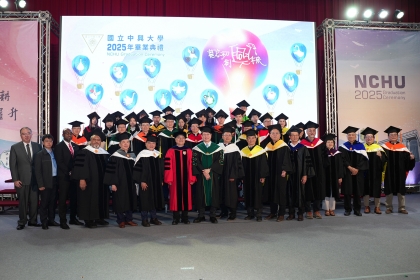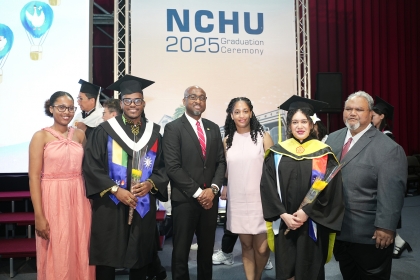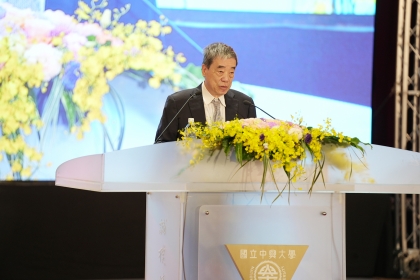NCHU Commencement Ceremony: Academician Hsiang-Tsung Kung Encourages Deep Thinking to Shape the Future
2025-05-26
興新聞張貼者
Unit秘書室
1,291
National Chung Hsing University (NCHU) held its 2024 commencement ceremony on the morning of May 24 at Huisun Auditorium, celebrating the graduation of 4,105 students. The event was presided over by NCHU President Fuh-Jyh Jan and featured a keynote address by Academician Hsiang-Tsung Kung, Bill Gates Chair Professor at Harvard University and President of the Taiwan AI Academy.
Distinguished guests in attendance included Palau Ambassador Extraordinary and Plenipotentiary to Taiwan David Adam Orrukem, Elroy Wilson, Minister Counsellor of the Embassy of Saint Vincent and the Grenadines, and Lin Wannian, Honorary Chairman of the NCHU Alumni Association. The ceremony was both grand and heartfelt.
In his opening remarks, President Jan encouraged graduates to maintain a deep sense of care and responsibility for the well-being of humanity amid global uncertainty. He pointed out that the world today is grappling with major challenges such as artificial intelligence, climate change, geopolitical tensions, and social justice. He emphasized that NCHU graduates embody the courage to face adversity, the capability to solve problems, and the moral conscience to make a difference. “In the future,” he said, “you should strive not only to become experts in your fields, but also to play key roles in making meaningful contributions to society.” He concluded with a message of inspiration: “Embrace the world with passion; influence the world with conscience; illuminate the world with hope.”
Delivering a speech titled “Thriving Amidst Uncertainties By Being a Thinker,” Academician Kung stressed the importance of thinking before action. He argued that it is only through explanation and deep thought that people can find direction in uncertain times. He offered four pieces of advice to help graduates become visionary thinkers of their generation:
1. Aim High Intellectually – Seek to make fundamental contributions. Don’t just follow trends—pursue what AI cannot do, like original thought and creative insight. Question authority and strive to surpass your teachers. Jump on transformative opportunities such as generative AI and AI factories.
2. Figure Out Your Own Thinking Methods – Everyone has their own set of “thinking tricks,” whether it’s sketching ideas, debating, writing, or thinking from first principles. The earlier you discover what works for you, the more effective your thinking will become.
3. Seize the Moment and Be Diligent – Inspiration is fleeting. When the urge to think strikes, act on it. Write down and expand ideas immediately. Use time before sleep to reflect—some of your best ideas may come when you wake.
4. Find Solitude – Creativity often begins in silence. Serious intellectual work requires quiet time alone to listen to your thoughts and emotions. Carve out your clearest hour or two each day to focus on self-directed intellectual pursuits.
Kung concluded that deep thinking is the road to the future and expressed his hope that graduates would become thinkers of depth—able to forge certainty in an age of uncertainty.
Palau Ambassador David Adam Orrukem extended his congratulations and praised the graduates for completing their studies under challenging circumstances. He also expressed gratitude to NCHU and Taiwan for their long-standing support of Palauan students, noting with pride that some Palauan students were among this year’s graduates.
Minister Elroy Wilson of Saint Vincent and the Grenadines shared a proverb: “If you want to go fast, go alone. If you want to go far, go together.” He encouraged graduates to value companionship in their life journeys, cultivate a spirit of collaboration over competition, and build networks with empathy and humility. He reminded them that true success lies not in titles or social media likes, but in “how many lives you’ve touched and how many relationships you’ve built.”
The commencement ceremony also welcomed several international guests who extended their congratulations, including Deputy Executive Director Sunh Arunrugstichai of the Thailand Trade and Economic Office in Taipei, Analyst Michael J. Kristiono of the Indonesian Economic and Trade Office to Taipei, and Dr. Weerapon Thongma, President of Maejo University in Thailand.
Distinguished guests in attendance included Palau Ambassador Extraordinary and Plenipotentiary to Taiwan David Adam Orrukem, Elroy Wilson, Minister Counsellor of the Embassy of Saint Vincent and the Grenadines, and Lin Wannian, Honorary Chairman of the NCHU Alumni Association. The ceremony was both grand and heartfelt.
In his opening remarks, President Jan encouraged graduates to maintain a deep sense of care and responsibility for the well-being of humanity amid global uncertainty. He pointed out that the world today is grappling with major challenges such as artificial intelligence, climate change, geopolitical tensions, and social justice. He emphasized that NCHU graduates embody the courage to face adversity, the capability to solve problems, and the moral conscience to make a difference. “In the future,” he said, “you should strive not only to become experts in your fields, but also to play key roles in making meaningful contributions to society.” He concluded with a message of inspiration: “Embrace the world with passion; influence the world with conscience; illuminate the world with hope.”
Delivering a speech titled “Thriving Amidst Uncertainties By Being a Thinker,” Academician Kung stressed the importance of thinking before action. He argued that it is only through explanation and deep thought that people can find direction in uncertain times. He offered four pieces of advice to help graduates become visionary thinkers of their generation:
1. Aim High Intellectually – Seek to make fundamental contributions. Don’t just follow trends—pursue what AI cannot do, like original thought and creative insight. Question authority and strive to surpass your teachers. Jump on transformative opportunities such as generative AI and AI factories.
2. Figure Out Your Own Thinking Methods – Everyone has their own set of “thinking tricks,” whether it’s sketching ideas, debating, writing, or thinking from first principles. The earlier you discover what works for you, the more effective your thinking will become.
3. Seize the Moment and Be Diligent – Inspiration is fleeting. When the urge to think strikes, act on it. Write down and expand ideas immediately. Use time before sleep to reflect—some of your best ideas may come when you wake.
4. Find Solitude – Creativity often begins in silence. Serious intellectual work requires quiet time alone to listen to your thoughts and emotions. Carve out your clearest hour or two each day to focus on self-directed intellectual pursuits.
Kung concluded that deep thinking is the road to the future and expressed his hope that graduates would become thinkers of depth—able to forge certainty in an age of uncertainty.
Palau Ambassador David Adam Orrukem extended his congratulations and praised the graduates for completing their studies under challenging circumstances. He also expressed gratitude to NCHU and Taiwan for their long-standing support of Palauan students, noting with pride that some Palauan students were among this year’s graduates.
Minister Elroy Wilson of Saint Vincent and the Grenadines shared a proverb: “If you want to go fast, go alone. If you want to go far, go together.” He encouraged graduates to value companionship in their life journeys, cultivate a spirit of collaboration over competition, and build networks with empathy and humility. He reminded them that true success lies not in titles or social media likes, but in “how many lives you’ve touched and how many relationships you’ve built.”
The commencement ceremony also welcomed several international guests who extended their congratulations, including Deputy Executive Director Sunh Arunrugstichai of the Thailand Trade and Economic Office in Taipei, Analyst Michael J. Kristiono of the Indonesian Economic and Trade Office to Taipei, and Dr. Weerapon Thongma, President of Maejo University in Thailand.




